Tag: civil rights
Primary Sources: Behind the Scenes of the Civil Rights Movements

The Library has invested in the creation of Reveal Digital’s Behind the Scenes of the Civil Rights Movement and now has access to the first batch of digitized content on the JSTOR platform. The following information about the collection was shared in Reveal Digital’s announcement:
Covering primarily the 1950s and 1960s, Behind the Scenes of the Civil Rights Movements provides access to primary source documents that focus on how ordinary citizens in the smaller communities viewed, participated in and lived through this historical era. When completed in 2025, the collection will include letters, general correspondence, logs, demonstration plan outlines, transportation logs and plans, meetings, worship services, photographs, newsletters, news reels, interviews and musical recordings from Black, Latine, Native American and Asian American Pacific Islander communities.
The eight compilations from the Atlanta History Center include:
- Alert Americans Association broadside “Martin Luther King…At Communist Training School”
- Atlanta American Council of Christian Churches documents on the Black Manifesto
- Clarence Bacote papers
- Coretta Scott King documents
- Herman L. Turner papers
- Jones family papers of Lovett School
- Roland M. Frye papers
- Southern Regional Council documents
A link to this collection can be found in the History: America guide under Parimary Sources by Topic > Civil Rights and in the Library’s A-Z Database list.
Primary Sources: Expanded access to ProQuest’s digital archives
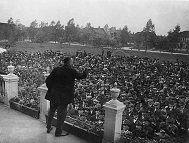 The California Digital Library is piloting an arrangement with ProQuest that provides access to 45 History Vault modules. At the end of the calendar year, UC may elect to purchase perpetual access to some of this content. Your feedback on which resources are most useful to you is welcome.
The California Digital Library is piloting an arrangement with ProQuest that provides access to 45 History Vault modules. At the end of the calendar year, UC may elect to purchase perpetual access to some of this content. Your feedback on which resources are most useful to you is welcome.
In the Library’s A-Z databases list, these resources have been grouped thematically into these categories; in some cases there are links to individual modules that we previously purchased. Once on the ProQuest platform, you can search within a single source or across multiple sources.
ProQuest History Vault – search across all ProQuest History vault collections
American Indians and the American West, 1809-1971 – Contains a large variety of collections from the U.S. National Archives, a series of collections from the Chicago History Museum, as well as selected first-hand accounts on Indian Wars and westward migration.
American Politics and Society – includes the collections: Thomas A. Edison Papers, Law and Society since the Civil War: American Legal Manuscripts from the Harvard Law School Library; Progressive Era: Reform, Regulation, and Rights; Progressive Era: Robert M. LaFollette Papers; Immigration: Records of the INS, 1880-1930; Records of the Children’s Bureau, 1912-1969; New Deal and World War II: President Franklin D. Roosevelt’s Office Files and Records of Federal Agencies; American Politics in the Early Cold War: Truman and Eisenhower Administrations, 1945-1961; FBI Confidential Files and Radical Politics in the U.S., 1945-1972; Students for a Democratic Society, Vietnam Veterans Against the War, and the anti-Vietnam War Movement; American Politics and Society from Kennedy to Watergate
Civil rights and the Black Freedom Struggle – includes the collections: Black Freedom Struggle in the 20th Century: Federal Government Records and Supplement; Organizational Records and Personal Papers Parts 1 & 2; and the NAACP Papers
International Relations and Military Conflicts – includes the collections: U.S. Military Intelligence Reports, 1911-1944; U.S. Diplomatic Post Records, 1914-1945; World War I: British Foreign Office Political Correspondence; World War I: Records of the American Expeditionary Forces, and Diplomacy in the World War I Era; Creation of Israel: British Foreign Office Correspondence on Palestine and Transjordan, 1940-1948; World War II: U.S. Documents on Planning, Operations, Intelligence, Axis War Crimes, and Refugees; Office of Strategic Services (OSS) – State Department Intelligence and Research Reports, 1941-1961; Confidential U.S. State Department Central Files, Africa and Middle East, 1960-1969, Asia, 1960-1969, Europe and Latin America, 1960-1969; and Vietnam War and American Foreign Policy, 1960-1975
Southern Life, Slavery, and the Civil War – includes the collections: Slavery and the Law; Slavery in Antebellum Southern Industries; two modules of Southern Life and African American History, 1775-1915, Plantations Records; Confederate Military Manuscripts and Records of Union Generals and the Union Army; and Reconstruction and Military Government after the Civil War.
Women’s Studies – includes the collections: Struggle for Women’s Rights: Organizational Records, 1880-1990; Women’s Studies Manuscripts from the Schlesinger Library: Voting Rights, National Politics, and Reproductive Rights; Women at Work during World War II: Rosie the Riveter and the Women’s Army Corps; and Margaret Sanger Papers: Smith College Collections and Collected Documents
Workers, Labor Unions, and Radical Politics – includes the collections: Labor Unions in the U.S., 1862-1974: Knights of Labor, AFL, CIO, and AFL-CIO and
Workers, Labor Unions, and the American Left in the 20th Century: Federal Records
OHC Director’s Column – February 2020
From the OHC Director…
Berkeley students and researchers from around the country reach out to us, especially during Black History Month, interested in our oral histories with African Americans. We always point people in the direction of our African American Faculty and Senior Staff oral history project, otherwise known as The Originals. And there is a good reason we do that: this project features seventeen lengthy and substantive oral histories with leading and pioneering UC Berkeley scholars and administrators (more on this below). But limiting our reference to this single project does service neither to OHC’s full collection nor to the amazing and accomplished individuals interviewed for other projects or simply based on their own merits. In preparation for this month’s column, I spent a day digging into our collection in an effort to uncover a host of hidden gems — in this case, interviews with African Americans whose living memories date to the early 20th century (at least) and offer first-person insights into the life of a Tuskegee airman, the contours of the West Coast jazz scene, the role of women in the Black Panthers, and much more.
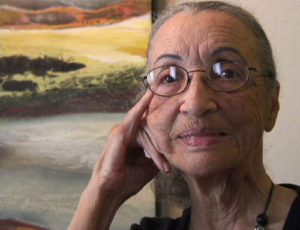
The migration of African Americans from the American South to the industrial centers of Northern California in World War II changed those who moved, along with the places they moved to. Drawn to jobs in places like the Kaiser Shipyards in Richmond, California, these migrants set down their roots in the Bay Area. In some interviews from the Rosie the Riveter / World War Two Home Front oral history project, Black “Rosies” tell about their lives in Jim Crow South, about the migration north and the hope for a better life, and about their experiences working in wartime industries and experiencing both greater opportunity but still discrimination based on race. Of the 197 Rosie project oral history, about a quarter are with African American women and men. It is likely folly to pull out one interview from this group, but I’m certain people will be interested in the story of Betty Reid Soskin, who not only worked in Richmond during the war but decades later became a ranger with the National Park Service at the Rosie the Riveter National Historic Site. Reid Soskin continues to work at the park today — at the ripe young age of 98!
One chapter in the Second World War that tragically demonstrated the enduring power of racism was the Port Chicago Disaster of 1944. The majority of the 320 killed and 340 injured in this accidental munitions explosion were African American. The eight oral histories of the Port Chicago project were recorded in the late 1970s and early 1980s by UC Berkeley scholar Robert Allen (whose life history interview we will be released this spring).
Our documentation of the African American experience in the Bay Area continues well past World War II. In a few major projects, Black East Bay residents — and their neighbors — offer accounts of not only the transformation during war but the important decades that followed. The On the Waterfront project follows several narrators through these decades. In the Oakland Army Base project, we hear from several African Americans (Charles Snipes, Cleophas Williams, Davetta Thibeaux, Ellen Wyrick-Parkinson, Elois Thornton, George Bolton, George Cobbs, Gordon Coleman, Grant Davis, Leo Robinson, Louis Harris, Margaret Gordon, Michael Thomas, Monsa Nitoto, Queen Thurston, and Robert Taylor) about their interactions with base, whether as a member of the military service, an employee of the Department of Defense, or as a resident of the nearby community of West Oakland.
The Civil Rights Movement is documented in our collection (though, admittedly, many more oral histories can be found elsewhere, such as at the Library of Congress), particularly as it
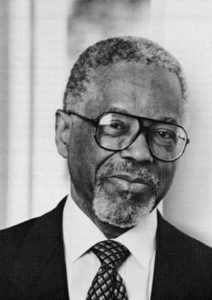
manifest in the San Francisco Bay Area in organizations that likely deserve more attention from researchers. Frances Mary Albrier was elected in the 1930s to the local Democratic Party Central Committee (and was welder during the war) and Terea Pittman became a leader of the NAACP (and many other organizations) in the earliest years of the Civil Rights Movement. The Council for Civic Unity, in addition, was established in the 1940s and was an important precursor to the California Fair Employment Practices Commission; Charles Patterson, in his interview, tells about the organization for which he was an intern before becoming a major figure in the foundation world (along with Ira DeVoyd Hall, who was a leader of the San Francisco Foundation). Orville Luster, who was interviewed in 1975, recalled his leadership of the unique Youth for Service organization which taught disadvantaged youth the skills necessary to be successful at work. And there is always a good deal of interest in the interview we hold with Ericka Huggins of the Black Panthers, which was donated to us by Fiona Thompson.
African Americans, not surprisingly, have played key roles in social justice work beyond the 1960s Civil Rights Movement. Henry Clark and Ahmadia Thomas and Carl Anthony were interviewed for their groundbreaking work in the area of environmental justice, while Michael Crawford and John Newsome were interviewed for our large project on Freedom to Marry, or the fight to win marriage equality. For our major project documenting the history of the Disability Rights and Independent Living Movements, we interviewed Chester Finn, Victor Robinson, and others.
Movement politics and protest is one way to force change, building institutions and running for elected office are other avenues pursued by African Americans we’ve interviewed over the years. I encourage you to read through two very interesting oral histories with three influential elected officials, Oakland Mayor Lionel Wilson and California State Assemblymen William Byron Rumford and Willie Brown (the second part of Brown’s oral history, covering his terms as San Francisco Mayor, will be released this spring). African Americans have made signal contributions to the law, as well: Cecil Poole, the first African American appointed as a United States Attorney in 1961, later became a distinguished federal judge; Allen Broussard rose up through the ranks of city and county courts, eventually joining the California State Supreme Court in 1981 as an associate justice; and to this day, US District Court Judge Thelton Henderson plays an outsized role in the area of law and civil rights.
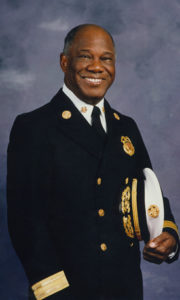
Law and politics are only two venues in which an individual can make an impact as the ethos of public service runs through many other institutional domains. Born just over 120 years ago, C.L. Dellums led a life of public service through many offices, perhaps most notably as through his decades as Vice President and then President of the Brotherhood of Sleeping Car Porters. After he had already done important work integrating the department, Robert Demmons was appointed the first African American Chief of the San Francisco Fire Department by Willie Brown in 1996. Everett Brandon might be little remembered today, but as a young man, he was a leader in San Francisco’s War on Poverty programs which brought services and employment to thousands of in the city. In recent decades, Joseph Marshall has continued the work of Brandon and others through his Omega Boys Club / Alive and Free service organization in San Francisco. The spirit of public service thrives in the private sector too. Our interviews with Ron Knox and Amanda Brown reveal how one of the largest private health care providers in the country have fought to improve health outcomes for African Americans.
The Oral History Center has long been committed to documenting our culture well beyond politics, law, and public service — we are deeply interested in the arts and the people who create them. Longtime OHC historian Caroline Crawford held an ongoing interest in documenting African American contributions to the arts, particularly music. Her interviews with Allen Smith (jazz trumpeter), Earl Watkins (jazz drummer), Gildo Mahones (jazz composer and pianist), John Handy (saxophonist, composer, and bandleader), and Jimmy McCracklin (blues singer and pianist).
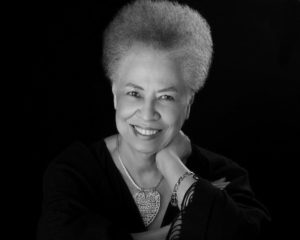
Finally, I want to bring this back around to education, as this is the root of all good things (dare I say) and I think it is essential for a university to document its role in improving society and creating new possibilities. I very much encourage you to take a deep dive into the African American Faculty and Senior Staff project, perhaps beginning with a 20 minute video we produced a few years back. This project, however, was years in the making and while we refer to this group of early faculty and staff as “the Originals,” the truth is that they weren’t the first. Our interview with Archie Williams is a true hidden gem of the collection. Williams attended Berkeley between 1935 and 1939, which was punctuated by an appearance at the infamous 1936 Olympics in Berlin at which he won a gold medal. Although too old to serve in a combat role in World War II, as a certified pilot he trained the Tuskegee airmen! He went on to a career as a respected educator. Marvin Poston was a student at Berkeley at the same time as Williams and eventually became a widely respected optometrist. In 1958, Robert Gibson was the first African American to earn a doctorate in pharmacy at UCSF, where he became a distinguished member of the faculty. Born in 1920, Emmett Rice earned his doctorate in economics at Berkeley in 1954, before being named to the Federal Reserve Board of Governors in 1979; it is worth noting that Rice’s daughter is Susan Rice, who served as UN Ambassador and National Security Advisor in the Obama Administration. A graduate of UC Berkeley and San Diego State, Del Anderson Handy had a distinguished career in education, culminating with a term as chancellor of San Francisco City College.
These oral histories represent a meaningful slice of OHC’s interviews with African Americans, but surely not the entirety of the collection. The Oral History Center encourages you to not only explore the interviews listed above, but dig even deeper into our collection, honoring the voices of those African Americans we interviewed by reading their words and absorbing their ideas and experiences.
Martin Meeker, Charles B. Faulhaber Director
Find these interviews and all our oral histories from the search feature on our home page. Search by name, keyword, and several other criteria. You can also find the projects mentioned here on our projects page.
Primary Sources: American Civil Liberties Union Papers, 1912-1990
 The UC Berkeley Law Library’s acquisition of the online resource Making of Modern Law: American Civil Liberties Union Papers, 1912-1990 provides campus-wide access to an important collection of papers focusing on civil rights, civil liberties, race, gender, and issues relating to the U.S. Supreme Court.
The UC Berkeley Law Library’s acquisition of the online resource Making of Modern Law: American Civil Liberties Union Papers, 1912-1990 provides campus-wide access to an important collection of papers focusing on civil rights, civil liberties, race, gender, and issues relating to the U.S. Supreme Court.
Trial: Digital resources related to Civil Rights, Japanese-American Relocation, Farm Workers, and Native Americans
The Library has set up trial access to evaluate four digital collections:
Ralph J. Bunche Oral Histories Collection on the Civil Rights Movement
National Farm Worker Ministry: Mobilizing Support for Migrant Workers, 1939-1985
Fight for Racial Justice and the Civil Rights Congress
Japanese-American Relocation Camp Newspapers: Perspectives on Day-to-Day Life
These are all part of a resource called Archives Unbound from Gale Cengage. The company was not able to set up a trial for just these four resources, so all of the collections are available to view.
Available via the same link is another trial resource, Indigenous Peoples: North America, which covers the history of American Indian tribes and supporting organizations. The collection includes sources from American and Canadian institutions, tribal newspapers, and Indian-related organizations. The collection also features Indigenous language materials, including dictionaries, Bibles, and primers.
I am particularly interested in your feedback on the resources listed above, but if you see other collections of interest, let me know and I’ll put them on my wish list.
Trial access ends 3/17/16.